MLS can’t afford to have these kind of strikers

- Share via
If there’s one thing Major League Soccer absolutely, positively cannot afford this season, it’s a strike by players.
So guess what the league is looking at only days before Friday’s scheduled season opener between the Galaxy and Chicago Fire at StubHub Center.
The collective bargaining agreement between MLS and the players union expired Jan. 31 and both sides have been locked in a staring contest ever since, hoping the other blinks first. Representatives of the union and the league recently met in New York and are scheduled to resume last-ditch talks with federal mediators Sunday in Washington, with free agency and higher pay remaining as the major sticking points.
The union is promising that the players will walk out if they don’t get both. And that would be disastrous for a league that has enjoyed more growth than any U.S. professional sports over the last five years, adding six teams, signing a national TV deal worth $720 million and seeing average attendance top 19,000 per game for the first time.
An extended work stoppage could undo all of that, causing irreparable harm to a fragile league preparing for its 20th season.
The four major U.S. professional leagues — the NHL, NFL, NBA and MLB — all struggled mightily in the wake of recent work stoppages and each entered those lockouts much richer, much more popular and with a far firmer foundation than MLS.
The loss of the 2004-05 NHL season, for example, cost teams an estimated $2 billion in revenue and players about $1 billion in salaries, according to the Wall Street Journal. TV ratings fell dramatically and the league was persuaded to make major rule changes in an effort to draw back its jilted fan base,
According to some estimates, baseball lost more than $1 billion in the 1994-95 lockout, which wiped out parts of two seasons and canceled a World Series. And it took more than a decade for average attendance, which had set a record in 1994, to return to prelockout levels.
The players say they don’t want that for MLS. But they also say they can’t accept the status quo either.
“We all have huge respect for the league and for everything that’s been done,” said midfielder Michael Bradley, whose $6.5-million salary with Toronto made him the league’s second-best-paid player last season. “But after almost 20 years we can all agree that to take this league where everyone wants to take it, changes need to be made.”
Some of those changes are ones the league, despite its protests, can afford. Although MLS says it is losing $100 million annually, it recently signed record sponsorship and broadcast deals while franchise fees have gone from $10 million to $110 million since 2004.
That apparently led MLS to seek compromise on pay and other minor issues, such as raising team salary caps from last season’s $3.1 million and increasing the minimum wage from an embarrassingly paltry $36,500.
But it says its single-entity structure, under which the league and its investors own all 20 teams as well as their players, makes free agency impossible because it would result in the league bidding against itself to sign players. Moreover, some in the league hierarchy believe the players’ talk of a strike over the issue is primarily a negotiating tactic.
Others aren’t buying that.
Ticket agency StubHub, whose name adorns the stadium where the league champion Galaxy plays, has already announced plans to refund tickets for games affected by a labor impasse while the union’s financial filings with the U.S. Department of Labor show it has stockpiled millions of dollars in a strike fund.
“We’ve known about this for a couple of years, saying we potentially could go on strike,” said Galaxy midfielder Kenney Walker, who was paid $48,250 last season, his third with the team. “We’ve been talking about it for 2 1/2 years. So we’ve been preparing.”
MLS has been down this road. Five years ago, the players voted overwhelmingly in favor of a strike, though that was never tested since a federal mediator helped forge agreement on a new CBA five days before the 2010 season was scheduled to begin.
“I think you can expect a similar timeline,” said Galaxy defender Todd Dunivant, the senior member of the union’s executive board. “I think it’s going to come down to the wire again.”
And many of the same points that were discussed then — player movement, compensation, league-mandated charitable appearances, even the length of the CBA — are back on the table. As a result, some players are insisting the union take a stronger stand to avoid kicking those issues down the road once more.
The battle lines have been drawn then, with neither MLS nor the union having left themselves much room to negotiate. So even the optimists now believe the players will walk before they run again, suggesting it may take the cancellation of Friday’s season opener, as well as the rest of the weekend’s schedule, to get either side to budge.
“I think we’ll get there,” Dell Loy Hansen, operator of Real Salt Lake, said on his team’s radio station during a series of candid interviews on the labor negotiations that earned him a record $150,000 fine from MLS. “Whether we get that first game or not, I think, is the game of chicken that always gets played.”
A game of chicken that could end with both sides having cooked their golden goose.
More to Read
Go beyond the scoreboard
Get the latest on L.A.'s teams in the daily Sports Report newsletter.
You may occasionally receive promotional content from the Los Angeles Times.







